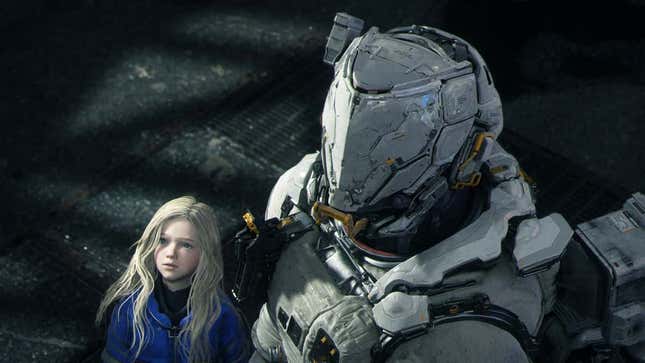
I had forgotten all about Pragmata by the time Capcom was setting up appointments to play the puzzle shooter at Summer Game Fest. We’re five years removed from its original announcement, and Capcom is no stranger to quietly hiding a game away and never releasing it (remember Deep Down?). So, I let the game disappear from my memory until its name showed up in my inbox. Perhaps it’s fitting then that Pragmata feels a bit like a game out of time, as its gruff old man protagonist, slow-moving enemies, and brutalist sci-fi aesthetic are all evocative of the over-the-shoulder shooters from the PS360 era. Given those seemingly bygone qualities, it’d be easy for Pragmata to feel rote and dated, but what I played was just inventive enough to feel novel. I was super impressed with it.
I’ve affectionately referred to Pragmata as “The Space of Us,” since it’s bringing back that early 2010s dad/daughter dynamic of The Last of Us, Bioshock Infinite, and The Walking Dead, yet with a science fiction spin. Hugh, a human man, is the primary playable character, but Diana, an android made to look like a human child, rides on his back as the two of them make their way through a derelict space station overrun by hostile, plodding robots. At first, Hugh’s guns don’t do much damage to these walking toasters. To lower their impenetrable defenses, Diana has to hack into their systems. The tricky part is that you have to manage both characters’ ability sets simultaneously and in real time.
On his own, Hugh’s ability set would have felt unremarkable. Man points, shoots, and dodges incoming attacks like any third-person shooter protagonist does. Separate from Hugh’s combat, Diana’s hacking mini-games, in which you move a cursor through a grid of obstacles and buffs to reach a defense-downing destination, are pretty straightforward. Putting them together is the peanut butter and jelly that makes a delicious sandwich.
Pragmata’s multitasking is what sets it apart from other games in a stale genre. Separately, these mechanics are simple, but together they create a challenging, satisfying loop that can feel frantic even when you’re trying to solve a more methodical puzzle. It’s very easy to get so distracted doing one action that you neglect the other. More than a few times, I ended up on the wrong side of an attack because I was so focused on solving one of Diana’s puzzles and wasn’t paying enough attention to dodge an incoming blow. This was all happening as I was learning the controls, which makes me wonder how well this game flows as the player becomes more adept at juggling both characters, the enemies become more powerful, and Diana’s hacking becomes more complex. There’s a lot of potential for this game to be either incredibly special or insufferably frustrating, and I’m eager to find out which one it is when it launches in 2026.